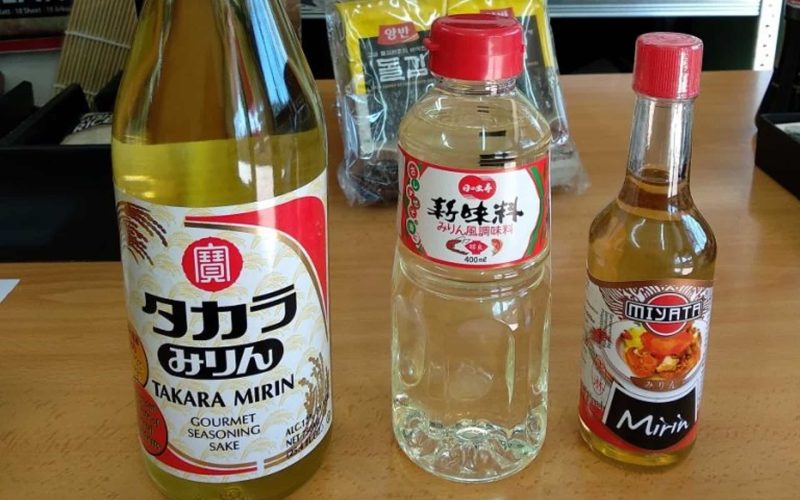At its most basic, mirin is a sweet cooking wine that enhances the natural sweetness of foods in Japanese dishes, such as sushi rolls or sukiyaki. But that’s just the tip of the iceberg regarding Mirin.
Mirin can be used in soups, sauces, marinades, and even desserts to add sweetness and flavor without adding calories.
Plus, it’s low in alcohol, so you don’t need to worry about consuming too much with your meal!
The list of best substitutes for mirin is given below.
1. Agave Nectar And Water
One of the best substitutes for mirin is a mixture of water and agave nectar. The ratio of these two ingredients should be about 1:1.
Moreover, this will create a sticky but clear liquid that can be used like mirin in any recipe that calls for it. You may simply combine one part of agave nectar.
And also, three parts water to use as a mirin alternative for foods that don’t require a lot of acidities. It is among the best substitutes for mirin because it is a fantastic alcohol-free choice.
Meanwhile, the “nectar” is really just a type of agave-based sweetener. The mixture that resulted? A very sweet and honey-like liquid that is clear and bright amber.
2. Kombucha
Kombucha is a naturally fermented tea that’s been around for centuries. And it has also been found to be a perfect substitute for mirin.
Moreover, it has a sour, vinegar-like taste, making it one of the best substitutes for mirin.
Kombucha is made from sweetened black or green tea that’s been brewed with a culture of yeast and bacteria.
You can find kombucha at most grocery stores these days. All you need for the best substitutes for mirin is fermented black or green tea, which is the most basic component of kombucha.
While many fruit-flavored options might not be the finest additions to your savory Japanese recipes.
Meanwhile, if simple ones aren’t available, ginger-flavored kombucha will do the trick. Similar to mirin, it can add acidity and sweetness to a dish. However, be aware that this carbonated beverage is rather bubbly.
3. Apple Cider Vinegar
Apple Cider Vinegar is probably the most one of the most common best substitutes for mirin in Japanese cooking.
It has a similar sweet taste to mirin and a similar texture. Also, it can be used as a substitute without much problem.
One of the main differences between mirin and apple cider vinegar is that apple cider vinegar does not contain sodium.
Some people find that when using apple cider vinegar as one of the best substitutes for mirin, their dish tastes too tangy and acidic.
Meanwhile, the flavor of the mirin cannot be substituted with anything else. This can be fixed by adding sugar or more rice wine to balance out the taste.
4. White Grape Juice
Mirin is a rice wine that is sweetened with sugar or honey. It is commonly used in Japanese cooking to give dishes an unmistakable flavor. You may not know that there are other kinds of grape juices available.
But white grape juice makes a fantastic non-alcoholic mirin alternative. You ask, what is it? It is a white-skinned grape extract.
This type has a light amber color that resembles mirin, unlike the dark purple beverage that most of us are used to. It can provide sweetness to food, but it doesn’t have the acidity of the Japanese condiment.
5. White Vinegar And Sugar
One of the best substitutes for mirin is white vinegar. Add one tablespoon to the recipe and replace the mirin with three tablespoons of sugar.
Moreover, brown rice vinegar can also be used as a substitution. To make this work, use two tablespoons of rice vinegar and add four tablespoons of sugar.
6. Balsamic Vinegar
Balsamic vinegar is a popular substitute because it’s sweet and tangy. But it can be too acidic if you don’t dilute it with water.
However, the acidity will decrease slightly if you add honey or brown sugar. Rice wine vinegar is another option.
It has a milder flavor than balsamic vinegar, so it might not be as noticeable if you use too much of it. White wine also works well as a substitute because of its sweetness and gentle flavor profile.
7. White Wine Vinegar
Mirin is a Japanese rice wine used in cooking. It’s sweet and savory, but it can be hard to find in the United States. White wine vinegar makes one of the best substitutes for mirin.
It has the same flavor as mirin and is readily available at most grocery stores. Add a tablespoon of white wine vinegar to your sauce or soup before serving.
8. Rice Vinegar
Rice vinegar is not one of the best substitutes for mirin, but it does a decent job in its place. Meanwhile, you can use rice vinegar instead of mirin if you are mindful of the differences in flavor.
Rice vinegar is slightly sweeter than mirin and tends to be more tart than sweet. Rice vinegar also has a stronger flavor profile and less saltiness than mirin.
9. Chinese Cooking Wine
Mirin is a sweet rice wine that is usually used to enhance the flavor of dishes in Asian cuisine if you don’t have any on hand or are cooking a dish that doesn’t require it.
However, there are plenty of other ingredients you can use as best substitutes for mirin. Any type of rice vinegar will work well in any recipe that calls for mirin.
Also, rice vinegar has a tangy flavor, so if your dish needs more sweetness than sourness, add sugar to it before using it.
Sweet sake also works as a great substitute and will not alter the flavor too much from what you expected.
To achieve the desired result with either option, use about 1 tablespoon for every 2 tablespoons of mirin called for in your recipe.
10. Vermouth
Vermouth is a light, sweet wine that can be used as one of the best substitutes for mirin. In addition, vermouth is typically white and flavored with botanicals, spices, herbs, and other flavorings.
It can be served by itself or mixed with gin to make a dry martini. Vermouth is not as sweet as mirin but has notes of citrus and licorice.
Also, it has an alcohol content of 15-19% ABV so it’s not as high in alcohol content as sake (20-25% ABV) but still higher than most wines (12-14% ABV).
11. Dry White Wine
Many people will try substituting mirin with dry white wine. This is a good option, but there are some things to remember.
Dry white wines do not have the same sugar content as mirin, so the amount of sugar should be increased if using wine.
Also, the cooking time may need to be increased as well if using wine because it has less alcohol and will evaporate quicker than mirin.
12. Sweet Marsala Wine
Sweet Marsala wine is one of the best substitutes for mirin. Sweet Marsala wine is just as sweet as mirin, but it also has a dry, tangy aftertaste that adds a lot to the dish.
Likewise, the wine can be found in most grocery stores and liquor stores, and it’s much cheaper than mirin. The alcohol content of the sweet marsala wine is high enough to be an excellent cooking agent.
13. Dry Sherry
Dry sherry is easy and cost-effective, making it one of the best substitutes for mirin. Add a tablespoon of dry sherry to your recipe instead of one tablespoon of mirin.
Also, you can try using a dash of rice vinegar. Rice vinegar has a more robust flavor than white wine vinegar. So if you’re looking for something that tastes similar to mirin but is stronger, rice vinegar is the way to go.
14. Sake
Mirin is a rice wine used as a cooking ingredient in many dishes and sauces. It is made with rice, sugar, and koji (a fungus that breaks down the starches in the rice).
Sake also contains rice and sugar but lacks the koji component. If you want to substitute mirin with sake, use 1 teaspoon of sake per tablespoon of mirin. Sake wraps up our list of the best substitutes for mirin.
Conclusion
Mirin is a Japanese cooking wine traditionally used to give dishes a sweet flavor and can be found in most Asian supermarkets. However, if you don’t have any mirin on hand, there are some best substitutes for mirin to use.
Mirin—a sweet cooking wine from Japan—can add excellent flavor to many recipes. It can also be expensive and difficult to find in some parts of the United States.
But never fear—there are plenty of good substitutes if you run out or cannot find any!
The best substitutes for mirin are listed above, so you don’t have to suffer without your favorite cooking wine ever again.





